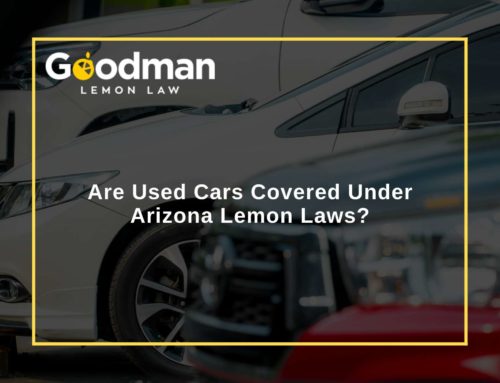You think the dealer sold you a lemon. You purchased your new car, drove it home, and suddenly the check engine light shows up. Or you’ve driven your new pickup for a month, and the noise from the rear axle keeps getting louder and louder. Or the used car you bought while still under warranty won’t start. What now? Do you own a lemon? It all depends on whether the dealer or the manufacturer can repair the problem and how quickly they get it done.
Federal and state Lemon Laws make it illegal for a dealership to sell you a defective vehicle while concealing its condition. Unethical dealers may use illegal means to hide a vehicle’s check engine light or conveniently fail to mention the vehicle’s past mechanical issues. As a general rule, however, most dealerships are fair and honest. Most dealerships want to keep customers happy and coming back to buy more vehicles. The car may have come from the manufacturer with a defect the dealer could not detect.
In any case, your vehicle does not meet the standards described in the warranty, and the defect significantly reduces the value or safety of the vehicle. What should you do?
Steps to Take When You Have a Defective Vehicle
The instant you find a problem with a car, truck, motorcycle, or RV and trailer under warranty, start a file and keep notes of the problems that your vehicle is experiencing. Complete and accurate documentation is the key to settling a Lemon Law claim. But hang on, you’re not to the Lemon Law claim process yet. You must take certain steps before you can claim your vehicle is a lemon.
The general process goes like this:
- Report the problem to the dealer or manufacturer.
- The dealership or car maker has the right to try to repair the problem. At no charge to you, the buyer, they can make up to four attempts to fix the problem. They cannot exceed four attempts, and the car cannot be in their shop for longer than one month total. Make sure you keep a record of every attempt to repair your car and how long the car was in the shop each time. The repair records the dealership gives you are the best evidence in your case. Make sure the records you receive from the dealership are accurate to what you reported and what was done.
- If they repair the problem within the four-try/one-month limit, they have met their obligation, and you drive away a happy customer. If an authorized manufacturer service center cannot repair your car within the legal limits, however, you take the next step.
- It’s a good idea to research the laws in your state, including the National Consumer Law Center, Better Business Bureau, and the state’s Lemon Law. Know your rights before preceding.
- Here is where your detailed notes and the records from the dealership are essential. Send a “demand letter” to the car company detailing the problems and the attempts to repair them and ask them to take back the car and refund your money.
- The manufacturer may honor your request and offer to take the car and return your money, or they may offer you a replacement vehicle, or they may propose a cash settlement and let you keep the car and continue to try to fix it with your own money.
- If the company denies your claim, or you are not satisfied with their proposed settlement, you take the next big step to hire a lawyer and file a lawsuit against the company.
If you get to step 4 above and think you have to start sitting in a dusty law library and crack open intimidating law books, you have a better option.
But first note that the Lemon Law isn’t the only protection you have as a buyer. Other state laws can help you if you have been subjected to a scam or fraud, such as consumer rights laws, auto fraud laws, misrepresentation laws, negligence laws, and breach of contract laws. Even if you fail to win your Lemon Law case, you have other legal options available to you.
More time in a library or endless searches on the internet? Possibly. There is still a better option, but in case you want to take the law into your own hands, the following steps are open to you:
Contact with State
If you think a dealer has ripped you off, head to the appropriate state protection agency, which is most likely the attorney general. The State Attorney General’s Office is empowered to investigate swindles and frauds.
File a Claim
The Attorney General’s office would only file a claim when it confirms that the dealership has breached the consumer protection laws. This process, however, wouldn’t help you get your money back.
Of course, if you take wise precautions at the outset of your car buying experience, you can avoid many potential problems. For instance be aware of the many scam tactics that can get you into trouble. Unethical dealers use quite a number of tricks when trying to sell a defective vehicle to an unsuspecting customer.
For example, “curb stoning” is a common practice where car dealers lure buyers to a vacant lot or a deserted roadside and sell them damaged cars without any required license. Before paying your hard-earned money to some curb-stone stranger, make sure to take a glimpse at the vehicle’s title history. It would tell if the car has recently changed ownerships or if the name on the title does not match the seller’s name.
Do a Thorough Investigation
The Lemon Law is a combination of federal and state laws The federal Lemon Law is the Magnuson-Moss Warranty Act, passed in 2015. Individual states have likewise passed their own versions of the Lemon Law. The Arizona law, for example, is presented in Revised Statutes Sections 44-1261 to 44-1267. According to the law, you must tell a dealer or manufacturer in a written form about the problem while the vehicle still is under the express warranty. The Lemon Law, however, isn’t a quick-fix to your problem. You must provide the dealer or manufacturer an opportunity to repair the vehicle. In fact, they can make four attempts to effect the repair. If they fail to do so, the dealer is obligated to take back the car and give a full refund including taxes and fees. Alternatively, they can replace the vehicle with the exact same model or some other model with a financial settlement to offset the difference.
The Better Option
As promised, a better option exists than wading through all the legal research, letter writing, and negotiating on your own. The Law Office of Michael J. Goodman specializes in Lemon Law cases. Mike understands the details and knows all the angles of Lemon Law litigation. A trusted attorney with considerable experience in Lemon Law settlements, Mike resolves 95 percent of his cases out of court. He will evaluate your case thoroughly and can tell you within 24 hours if you have a winnable case. Put Michael J. Goodman to work for you to protect your rights and get you the fair settlement to which you are entitled by law.








